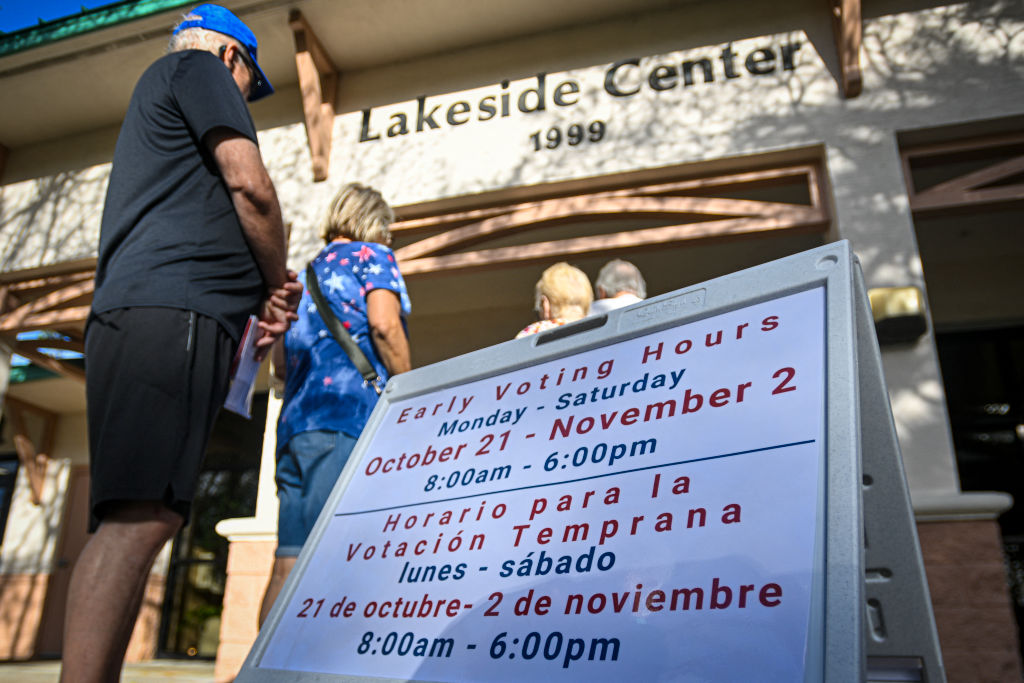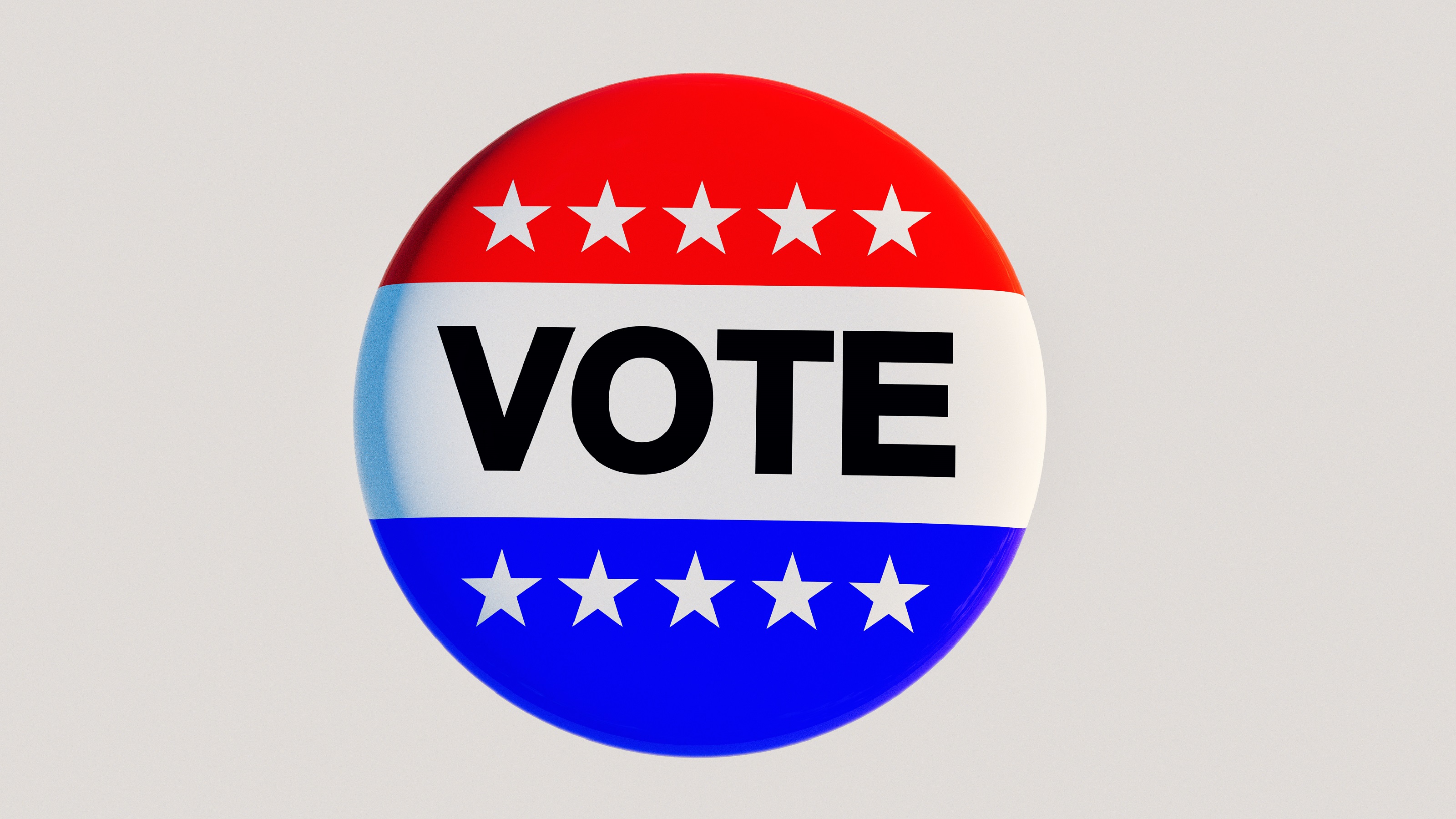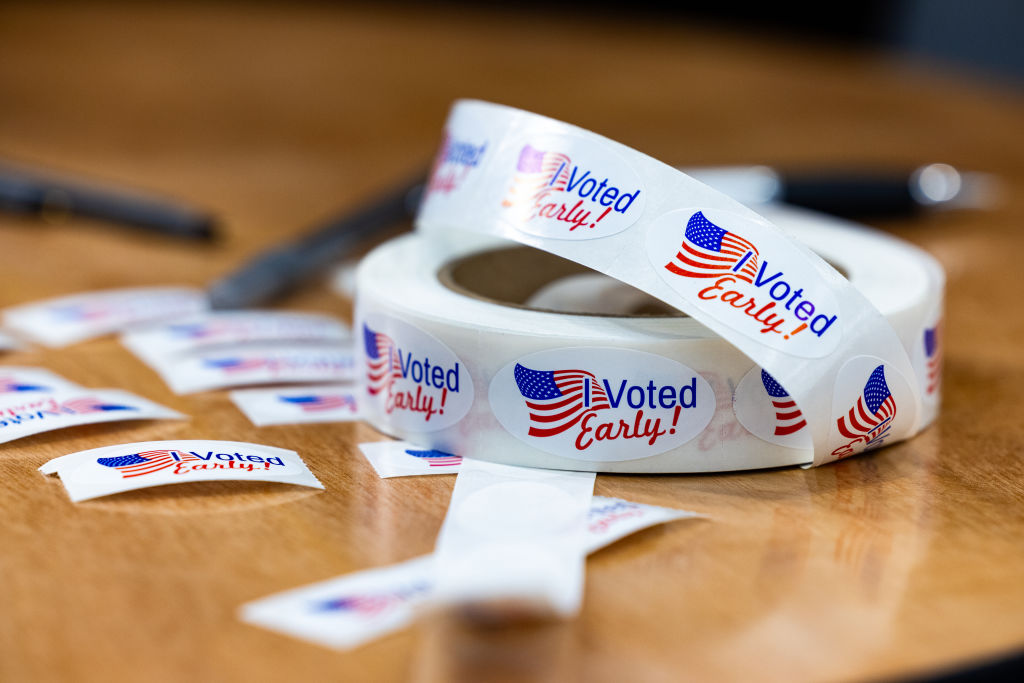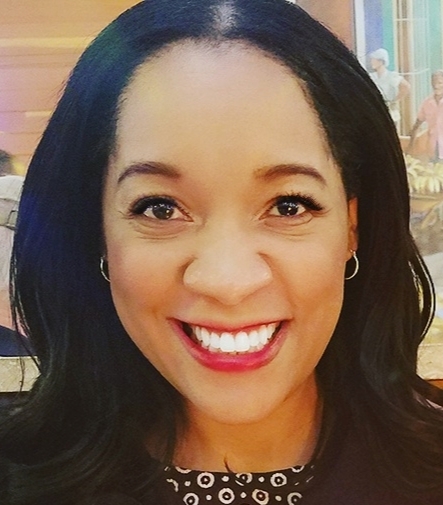Today is the day, and the Kiplinger team has been keeping a close eye on what the candidates are saying and what their plans could mean for you and your finances should they come to fruition.
Here, we're sharing news updates along with commentary and analysis from Kiplinger experts, as Donald Trump and Kamala Harris face off for the White House and battles play out for the House and Senate.
Scroll down for updates and analysis.
Latest election-related stories: Election Poll Surprise Driven In Part by 65+ Female Voters | Harris vs. Trump's Tax Wish List: Income Tax, Capital Gains, Estate Tax and More | Which States Will Bear the Brunt of Trump's Tariff Plan?

Alexandra covered the 2016 election for Elite Daily, traveling from the Iowa caucus to both parties' conventions and the final presidential debate in Las Vegas. She was at the Javits Center on election night to cover the Clinton campaign event. She additionally worked on midterm election coverage for Bustle and ABC News in 2018 and 2022, served on an ABC News fact-check team during 2019 primary debates, and helped manage election coverage for ABC News' website in 2020, including leading coverage on Jan. 6, 2021.
Harris talks economy on Fox News while Trump does on Univision
Both Vice President Kamala Harris and President Donald Trump took moments to try to tout their plans for the economy Wednesday night in high-profile appeals outside their voter base comfort zone.
Harris undertook a 27-minute interview with Bret Baier on Fox News that started combatively and ended combatively, marked by plentiful interruptions and firm, if nominally polite, disagreements. Midway through the interview, Harris pushed to discuss her economic plans, mentioning topics like "affordable housing" (likely referring to Harris' plan for down payment assistance for first-time homebuyers, along with the construction of 3 million new housing units), "strengthen[ing] small businesses" (she's proposed expanding tax incentives), and "taking care of young parents" (Harris has called for expanding the child tax credit).
Read more: Kamala Harris Child Tax Credit Proposal: What to Know
Asked why people say they trust Trump on the economy more than her, Harris said her plan will strengthen the economy while his "would be again to give tax cuts to billionaires and the biggest corporations in our country and blow up our deficit."
Meanwhile, Trump took questions on a town hall with Univision, the Spanish-speaking television network. There, he answered a question about the economy with his plan to increase domestic energy production ("drill, baby, drill," as he says) in order to decrease costs. Asked about creating job opportunities, he pointed to his plan for "a combination of taxes, tariffs and incentives."
Read more: Tariffs: What They Are and How They Impact Your Wallet
Of course, there are pros and cons to each proposal. Harris' homebuyer credit could increase demand and help sellers without an adequate rise in housing units, and Trump's energy plan won't necessarily move the needle on gas prices and electricity, which are impacted by a wide variety of factors, while his tariffs could end up increasing the price of products for consumers.
In both cases, if executed as stated, their economic plans would increase national debt, per a Committee for a Responsible Federal Budget analysis. Trump's would increase debt by $7.5 trillion, while Harris' would notch $3.5 trillion through 2035.
What experts say about Harris' first-time homebuyer proposal
One of Democratic candidate Harris' proposals to help Americans' personal finances is a $25,000 down payment assistance for first-time homebuyers, along with a call for the construction of 3 million new housing units. This, she says, will both help buyers afford down payments and help address the housing supply shortage.
What do financial experts have to say about that plan? Kiplinger personal finance writer Erin Bendig heard from multiple finance and real estate professionals about the proposal. While there were acknowledgments it could help buyers, there were also concerns it could do more to help sellers.
Read more here: Is Harris’s $25k Down Payment Assistance Good or Bad for Homebuyers?
How the election could impact retirement
Kiplinger took a look at five ways the election could change your retirement. One of the main points under the first way it could change things, market volatility, is that the stock market does pretty well even if the presidency and Congress are of different parties.
A takeaway from that? “Reacting to election news in the near term is ill-advised,” a Voya Financial study concluded. If your party loses, don’t let the defeat cause pessimism or fear that could cause you to stray from your investment plan.
Read more: Five Ways the Election Could Change Your Retirement
- Ellen Kennedy

Ellen writes and edits personal finance stories, especially on retirement. She also covers some consumer products, such as credit cards. She worked in the mutual fund industry for 15 years as a manager and sustainability analyst at Calvert Investments. She covered consumer staples, energy, water and climate change.
Early voting underway in more states including Texas and Florida
Several states opened up early voting today and over the weekend, joining the approximately half of American states that have already begun early voting. Early voting, as a reminder, is generally when locations are open on days before Election Day for people to cast their votes.
States opening polls Monday include Alaska, Arkansas, Connecticut and South Carolina. Early voting also started today in the state of Texas. Colorado has all-mail voting, and in-person voting centers are open starting today.
In Florida, early voting started in many counties Monday, including Brevard, Seminole, Hillsborough (where Tampa is), Orange (home of Orlando), Broward (Fort Lauderdale), Miami-Dade, Palm Beach, St. Lucie and more. The Villages community includes Sumter and Marion counties; early voting began in Marion County today, including a polling location at The Villages' Mulberry Center, while early voting begins tomorrow, Oct. 22, for Sumter County.

Early voting opened in other states and increasing counties over the last week including in Idaho, Iowa, Kansas, Massachusetts, Nevada, North Carolina, Rhode Island, Tennessee and Washington.
Early voting availability and requirements often varies by county, so you should check your specific information before heading to the polls.
Many people are taking advantage of early voting and mail-in ballots so far in this election season. Louisiana, which started early voting last week, set a new record for the first day of early voting, according to the Louisiana Illuminator, as nearly 177,000 voters participated. And in Georgia, where early voting started a week ago, over 1 million people have already voted, per the Atlanta Journal-Constitution.
McDonald's takes the spotlight
McDonald's (MCD) took the spotlight in the presidential election this weekend — and why not, as an American icon itself. Harris has touted her time working at McDonald's while she was in college, so now Trump has taken a turn beneath the golden arches.
Trump, donning an apron over his white button-down and red tie, "worked" at a McDonald's location in Bucks County, Pennsylvania, of course, a notable state in the election on Sunday. He fried fries and handed orders through the drive-thru window. It should be noted: The restaurant was closed while Trump was there. This was more a stunt than a hard day's work.
Harris, saying she grew up middle class, has spoken about working at McDonald's when she was a student, striking a contrast to Trump's life experience. Trump's visit, as is typical of most of his visits, prompted support from his supporters and protests from his critics, as well as misinformation attempting to cast a cloud over Harris' experience.
For its part, McDonald's said in a memo to employees obtained by CNN that it did not invite Trump; McDonald's famously runs on a franchise model, where independent owners can do things like invite a politician to visit. The visit has not had much of an impact on the stock, which dipped about .35% so far today, in line with the S&P 500's .28% dip.
"McDonald’s does not endorse candidates for elected office and that remains true in this race for the next President. We are not red or blue – we are golden," the memo said.
Early voting opens in Wisconsin, Missouri, more
Early voting is starting in more states on Tuesday, including Missouri, Wisconsin, Hawaii and Utah. Different states qualify this in different ways: In Wisconsin, this is in-person absentee voting, while in Missouri, this is no-excuse absentee voting (as in, you can vote absentee without providing an excuse for why you need to).
Hawaii has all mail-in voting, so what's opening starting today is the option to turn in ballots or vote in-person at a voter service center. Check the Hawaii election site for more information.
In many states, early voting dates differ by county, so check your local information before going to the polls.
Elon Musk and Mark Cuban face off
A growing side plot in this election has been a battle of the billionaires. In Trump’s corner, you’ve got Elon Musk (net worth $245B, per Forbes), and in Harris’ corner, Mark Cuban ($5.7B, per Forbes).
Musk has been making rally appearances and, of course, spouting off on X, which, in case you forgot, he owns. In a new stunt, he’s paying a randomly selected registered voter who signs a petition by his PAC $1 million every day until Election Day. It may and may not be particularly legal.
Cuban, meanwhile, has been stumping for Harris, making the rounds in the media and in person at campaign events. On CNBC Monday, he went as far as to say, “It’s the Harris campaign versus Elon, not even versus Trump.”
Naturally, the shark and the spaceman have also taken their beef to the internet:
You can't stop thinking about me @elonmusk Can you ? It's ok. I understand. If I supported a candidate that was so incompetent I had to take over and fund their ground game, I would be looking for a distraction too. https://t.co/2xkjac6fTBOctober 17, 2024
The billionaires’ fight is particularly interesting given the candidates’ policy recommendations as it pertains to, well, billionaires.
Harris, for instance, has said she would strengthen Social Security “by making millionaires and billionaires pay their fair share in taxes.” Harris’ capital gains tax proposal would increase the top rate to 28%, but only for those taxpayers whose taxable income exceeds $1 million. Many pro-Harris ads, too, make the case that while Trump is out to support billionaires, Harris is out to support more average Americans.
Trump has said he supports cutting taxes, although he hasn’t presented a specific proposal on what he would do to capital gains. The Project 2025 blueprint, however, calls for dropping the top long-term capital gains tax rate to 15% from its current 20%.
Read more:
Headline roundup: Dimon, Fed and investors

Taking stock of recent news items today, there are a few stories of interest.
WaPo: "Trump advisers discussed demoting a Fed official — and it’s not Powell"
Andrew Ackerman of the Washington Post reports bank executives and former Federal Reserve officials expect Trump would not demote Chair Jerome Powell, against whom he's lobbied criticism, but would try to demote Michael Barr, "the Fed board member tasked with regulating Wall Street."
WSJ: "Wall Street Pros Get Into Position to Profit From a Trump Win"
Caitlin McCabe of the Wall Street Journal reports hedge funds and money managers "are getting behind trades that could pay out" if Trump wins, indicating a shift in momentum sensed by them.
NYTimes: "Jamie Dimon Privately Supports Kamala Harris. He Just Won’t Say So."
If hedge fund managers are thinking Trump's going to win, JPMorgan CEO Jamie Dimon is hoping Harris will, at least according to The New York Times' Rob Copeland. Despite a public vagueness of his opinion, those close to him have said he personally supports Harris, per the reporting.
Read more:
Harris set to join CNN town hall
Vice President Harris will be joining a town hall with undecided voters tonight at 9 p.m. ET. It is a live audience and will be hosted by CNN. CNN reports Trump declined to participate in a CNN town hall. He did, though, join a Univision town hall last week.
Bill Gates quietly joins the battles of the billionaires, Buffett stays mum
Microsoft founder Bill Gates has joined fellow billionaires Mark Cuban and Elon Musk in participating in this presidential election — but not on Musk's side. According to reporting from The New York Times, Gates donated about $50 million to Future Forward, a nonprofit that supports Vice President Harris’ campaign.
Gates joins Mike Bloomberg in making a donation to Future Forward, per the Times.
Other high-profile billionaires have chosen to stay mum this election cycle. Warren Buffett put out a message saying he does not and will not “endorse and support political candidates.” Facebook’s Mark Zuckerberg has made a show about not endorsing a candidate this cycle. Ray Dalio of Bridgewater has also said he won’t make an endorsement, although he has expressed fear for democracy, as in if Trump loses and doesn't accept losing.
Overall, Harris is getting more support from billionaires than Trump, per a Forbes analysis. Forbes found 81 billionaires back Harris, while 50 back Trump.
What to consider in your financial plan this election season
Investment adviser Jared Elson writes for Kiplinger that, despite common assumptions that they will either rout or boost the markets, elections don’t tend to have much impact, regardless of which party’s candidate wins the Oval Office. One aspect you could consider for this election, however, is taxation.
Regardless of which party wins, it’s likely we are enjoying the most favorable tax environment we will see for years to come. With some provisions of the Tax Cuts and Jobs Act due to expire at the end of 2025, barring congressional action, any action you can take to lower your future tax burden is likely to save you money in the long run.
Read the full article here: This Election, Your Financial Plans Should Focus on Taxes
- Joyce Lamb

Joyce Lamb edits articles from hundreds of financial experts about retirement-planning strategies, including estate planning, taxes, personal finance, investing, charitable giving and more.
Headline roundup: John Kelly, early voting and more
Heading into the evening, here are some headlines from around the mediascape.
NYT: “As Election Nears, Kelly Warns Trump Would Rule Like a Dictator”
John Kelly, who served as chief of staff to Trump during his presidency, said in conversation with The New York Times that he believes Trump “met the definition of a fascist, would govern like a dictator if allowed, and had no understanding of the Constitution or the concept of rule of law,” per reporter Michael S. Schmidt.
WSJ: “The Secretive Billionaire Network Funding ‘Stop the Steal’ 2.0”
Rebecca Ballhaus of the Wall Street Journal reports over $140 million has been donated to loosely connected group “that work on what they call election integrity.”
AP: “Rudy Giuliani ordered to turn over NYC apartment and 26 watches to Georgia election workers”
A judge ordered Giuliani must turn over a chunk of valuable possessions, including his New York City apartment, as part of a $148 million defamation judgment won by Georgia election workers. The election workers said they faced death threats after Giuliani pushed claims the 2020 election was stolen from Trump.
Absentee applications due in Florida, Indiana tomorrow

If you want to apply to vote absentee by mail in the states of Florida and Indiana, tomorrow (Thursday) is the last day to apply. See more information on Florida's elections site and Indiana's elections site.
Pre-election jitters hit interest rates
The 10-year Treasury yield ticked up on nervousness about federal fiscal deficits, the Kiplinger Letter team reports. Both candidates’ plans could increase the deficit. If enacted as proposed, Trump’s economic plans would increase debt by $7.5 trillion through 2035, while Harris’ would increase debt by $3.5 trillion, according to an analysis by the Committee for a Responsible Federal Budget.
See more about the rates from the Letter team here: Kiplinger Interest Rates Outlook: Pre-election Jitters
Voting deadlines and notables today and tomorrow
Early voting kicks off today (Thursday) in Maryland, and it will kick off tomorrow (Friday) in Delaware.
As we noted yesterday, the deadline to apply to vote absentee is today in Florida and Indiana, and the deadline is tomorrow to apply to vote absentee in Arizona, Georgia, Nebraska, South Carolina, Texas and Utah. Rules vary by state and often by county, so check your own information first with your locality.
Additionally, tomorrow is the last day to register to vote in Nebraska and Utah, although in Utah if you miss the deadline, you can register to vote at an early voting location or Election Day location, but you will need two forms of identification.
About 18 million Americans have already cast ballots, by mail or early voting, according to The Hill.
Election causes financial stress and anxiety
If you’re feeling financial anxiety this election cycle, you’re not alone. A whopping 76% of people surveyed by Citizens Financial Group reported feeling more financial stress and anxiety now than during any other election.
People are not just having anxiety, but acting on it – by not acting. Per the survey, nearly 1 in 5 have delayed family decisions and 15% avoided switching jobs because of the election, while nearly a quarter delayed buying or selling a home. People are also delaying saving for retirement, particularly around investing or moving funds in the markets. On a totally unrelated note, I’d like to remind you that with a long enough timeline, a time period like an election is a blip, and anyways, you have a low probability of accurately timing the market.
Trump’s proposed plans would worsen Social Security funding gap

The trust funds that pay Social Security benefits are running out of money and will be insolvent by 2033 to 2034, according to recent government estimates. Under current law, the funds will only pay 79% of benefits at that time, meaning that high-income couples could see their annual Social Security payments cut by over $21,000.
Donald Trump’s fiscal policies, if enacted as stated, would drain funds from Social Security even more quickly than at the current rate, according to a recent report from the non-partisan Committee for a Responsible Budget (CFRB). They found under Trump’s plans, Social Security would become insolvent three years earlier, in 2031, and benefits would be cut by 33% by 2035.
The report cited several Trump policy proposals that would worsen Social Security’s funding. Although his proposal to end the tax on Social Security benefits sounds like a win for seniors, for example, it would remove an important source of revenue for the Social Security program. Ending taxes on tips and overtime pay would also reduce Social Security’s funding. And cracking down on immigration would lower the number of immigrant workers paying into Social Security benefits.
Finally, Trump’s proposal to fix Social Security’s shortfall by selling America’s oil and gas reserves would not address the underfunding problem. That measure would inject only $20 billion into Social Security, but the present 75-year shortfall is $22 trillion.
- Ellen Kennedy
Read more:
Early voting starts in Delaware, plus more states over weekend, as other voting deadlines hit
Early voting started today (Friday) in Delaware, and reports show the polls are busy, as they have been in other states.
Early voting is set to begin tomorrow (Saturday) in Michigan, a key swing state, as well as in New Jersey and New York.
Meanwhile, the deadline to apply in-person for an absentee ballot is today in Arizona, Georgia, Nebraska, South Carolina, Texas and Utah. The deadline is tomorrow in Alaska.
The deadline to register to vote is today in Nebraska and Utah, although you can get a provisional ballot in Utah on Election Day with appropriate forms of identification.
The deadline to register to vote is tomorrow (Saturday) in Massachusetts and New York.
Voting deadlines today and tomorrow
Early voting is underway in dozens of states as of this week —and it's due to end soon enough, as we lead up to Election Day next Tuesday. The early voting window ends tomorrow (Tuesday) in Louisiana.
Meanwhile, on absentee ballots, the deadline is tomorrow to request an absentee mail-in ballot in California, Kansas, Massachusetts, Minnesota, North Carolina, Ohio and Pennsylvania. Colorado has all-mail voting, and the request for an address change to get the ballot is today there.
And if you are planning on sending in an absentee ballot, I'd recommend sending it by tomorrow if you're a Louisiana voter. Absentee ballots there need to be received by 4:30 p.m. the day before Election Day, so getting it in the mailbox by tomorrow will help ensure it gets there on time.
Second-to-last weekend before election brings celebrities and insults
The candidates are searching for their last big moments before Election Day, and this weekend certainly saw some eyebrow-raisers.
On Trump’s side, the weekend ends with lowlight reels from his rally at New York City’s Madison Square Garden showcasing a litany of racist and vitriolic comments made. On Harris’ side, the weekend ends with highlight reels of celebrity support from the likes of Democratic standbys Bruce Springsteen and Beyoncé.
Of course, as we know from 2016, celebrity support does not necessarily equate to victory at the polls, just as controversial comments do not necessarily equate to loss, but it was certainly a bizarre split-screen moment Sunday as a speaker at the Trump rally made an offensive joke about Puerto Rico, while Puerto Rican superstar Bad Bunny posted his support for Harris.
Former first ladies also made appearances this weekend. Melania Trump made a rare appearance at the MSG rally for her husband, while Michelle Obama gave a speech in Michigan that largely spoke about women’s rights and safety.
Headline roundup: Inflation, taxes and more
Heading into the afternoon, here are some headlines from around the media:
NYT: "Trump Keeps Promising New Tax Cuts. Other Republicans Are Wary."
At the tail-end of the election season, Trump has been stacking up proposed tax cuts: On tips, overtime, Social Security benefits and, most recently, income tax (his running mate, JD Vance, has already said that one is not "realistic"). He says he'll make up losses by imposing tariffs, something many economists and think tanks have pointed out is also not realistic.
Here, The New York Times' Andrew Duehren looks at the proposals from the perspective of Republican lawmakers who, he reports, may see Trump's tax cut ideas as "too expensive and outlandish" to embrace.
WSJ: "Economists Warn of New Inflation Hazards After Election"
In a similar vein, the Wall Street Journal's Nick Timiraos reports that "economists and even conservative-leaning advisers worry that the ideas backed by Trump, in particular, risk stoking the embers of inflation."
Read more: Tariffs: What They Are and How They Impact Your Wallet
CNBC: "Philadelphia DA sues Elon Musk PAC to stop $1 million lottery for voters"
As threatened, the billionaire now faces legal consequences for his election stunt in support of Trump.
Election investing outlook
Long-term investors would do well to ignore pre-election noise and instead tune into Nicholas Colas and Jessica Rabe, co-founders of DataTrek Research. Colas alone has had skin in the game through every election cycle for roughly four decades.
While this hardly confers upon him the wisdom of the ages, he's definitely seen a thing or two. So, let's check in with Colas and Rabe's latest thoughts on what the election could mean for markets.
But before we proceed, let's do a reality check. Although there will be winners and losers depending upon the outcome of the election, anyone trying to generate alpha based on the anticipated relative performance of asset classes and sectors might want to check their job description.
Are you a trader or tactical investor? If the answer is yes, then these potential price movements are highly relevant. If, on the other hand, you are a retail investor who mostly owns a bunch of diversified funds, these relative price movements are sort of irrelevant, aren't they? After all, you're betting on the bull market.
Which brings us to the best news from Colas and Rabe's latest report. True, there will be relative outperformers and underperformers among asset classes and sectors. But, the bottom line is that everyone who is long U.S. stocks should continue to be pleased. After taking a deep dive into the historical data, DataTrek shared the following with clients on Tuesday (emphasis ours):
"In the weeks after former President Trump’s 2016 win, there were clear winners (the U.S. outperformed rest-of-world stocks, Financials and Energy) and losers (10-year Treasuries). Markets have been running the same playbook over the last month. If he wins again, this momentum will likely continue. President Biden's 2020 win came during the Pandemic Crisis, clouding any analysis. That makes it harder to write a Harris victory playbook. All we know for sure is that the U.S. economy continues to chug along and corporate profits are still growing. We like U.S. equities regardless of who wins next week."
- Dan Burrows
Dan Burrows is Kiplinger's senior investing writer, having joined the august publication full time in 2016. A long-time financial journalist, Dan is a veteran of SmartMoney, MarketWatch, CBS MoneyWatch, InvestorPlace and DailyFinance.
Voting deadlines approaching swiftly

Early voting
Early voting is beginning in Oklahoma today (Wednesday) and in Kentucky tomorrow, but it's coming to a close in many places soon.
Early voting ends tomorrow in Maine, Maryland and Tennessee.
Absentee ballots
Today is the last day to request an absentee ballot in West Virginia. That deadline is tomorrow in Maine and Alabama.
If you are mailing in an absentee ballot in any of the following states, you should aim to get it posted today, as it must be received by Election Day deadlines: Alabama, Arizona, Arkansas, Colorado, Connecticut, Delaware, Georgia, Hawaii, Idaho, Indiana, Iowa, Kentucky, Maine, Massachusetts, Michigan, Minnesota, Missouri, Montana, Nebraska, New Hampshire, New Mexico, North Carolina, Oklahoma, Pennsylvania, Rhode Island, South Carolina, South Dakota, Tennessee, Wisconsin and Wyoming.
Voter registration
There is still time to register to vote in the following states: Colorado, Connecticut, Hawaii, Idaho, Iowa, Maine, Maryland, Michigan, Minnesota, Montana, Nevada, New Hampshire, New Mexico, North Carolina, North Dakota, Vermont, Virginia, Washington, Wisconsin and Wyoming.
Voting rules vary by state and, often, by locality, so be sure to check your own information.
Election betting vs polls
Should you trust election betting sites or polls? Sites like Polymarket, the world's largest prediction market, allows folks to wager money on who will win the election. And Robinhood Markets, an online broker, recently launched election contracts, similar to options, for people to trade (with limitations). Many of these sites have former President Donald Trump beating Vice President Kamala Harris by a wide margin, but some are warning about reading too much into these numbers.
"Betting on Trump? Too many people are falling into this trap," says Jay Woods, chief global strategist at Freedom Capital Markets. "They're quoting betting sites and what the betting odds are on Trump winning but the polls are spot on. It is a dead heat right now. He's got a 20% lead in the betting polls. The Jets were favored to win too, and they lost. It's just where the money is going."
- Karee Venema

With over a decade of experience writing about the stock market, Karee Venema is the senior investing editor at Kiplinger.com. She joined the publication in April 2021 after 10 years of working as an investing writer and columnist at Schaeffer's Investment Research. In her previous role, Karee focused primarily on options trading, as well as technical, fundamental and sentiment analysis.
What is Florida’s Amendment 5 on the ballot?
Florida voters already started hitting the polls in early voting, and they’re facing a slew of amendments to vote on. Of course, a more high-profile one is Amendment 4, a ballot measure intended to protect abortion rights in the state, which currently has a six-week ban on the medical procedure.
Right below that is Amendment 5, which addresses property taxes. This constitutional amendment, if approved, would tie the homestead exemption to the national inflation rate, so if the inflation rate rises, so, too, would the homestead exemption. Theoretically, that means homeowners would pay less in property taxes.
Opponents, though, have pointed out that, in turn, would mean local governments would get less tax money — about $23 million less in the next fiscal year, according to WCTV.
The proposed amendment came from a bill sponsored by Rep. James Buchanan, a Republican in Sarasota, who acknowledged, per WCTV, “It’s something [local governments] will account for and budget for just like at the state level.”
TCPalm reports split recommendations on the amendment from Florida newspapers. The editorial boards of TCPalm, Palm Beach Post, the Orlando Sentinel, and the South Florida Sun Sentinel all recommend voting “no” on it, while the editorial boards of the Tampa Bay Times and Miami Herald recommend voting “yes.”
For what it’s worth, while there’s a big price tag for the local governments, the proposed added inflation break doesn’t look that exciting on an individual level, at least according to Dorothy Jacks, the Palm Beach County property appraiser, who told WPTV it would amount to “about $40 more in Palm Beach County” this year. Though, as Jacks said, “every little dime and penny counts.”
Voting deadlines this weekend
Early voting
Early voting ends today (Friday) in: Arizona, Georgia, Idaho, Massachusetts, Nevada, Texas and Utah. It ends this weekend in: Kentucky, Mississippi, New Mexico, North Carolina, Oklahoma, South Carolina, Virginia, West Virginia, Wisconsin, Connecticut, Delaware, Michigan, Minnesota, Missouri, Montana, Nebraska, New Jersey, New York, North Dakota, Ohio, Rhode Island, Vermont and Washington.
Absentee ballots
The deadline to request an absentee ballot is today in: Arkansas, Idaho and Louisiana.
If you are mailing in an absentee ballot, many states have deadlines of receipt by Election Day.
Voter registration
The deadline to register to vote is today in Wisconsin and tomorrow in North Carolina and New Mexico.
You are still able to register to vote in Colorado, Connecticut, Hawaii, Idaho, Iowa, Maine, Maryland, Michigan, Minnesota, Montana, Nevada, New Hampshire, North Dakota, Vermont, Virginia, Washington and Wyoming.
Taxes on state ballots this Election Day

With election week finally here, you may have heard more than you wanted to about federal tax policy. As Kiplinger has reported, the presidential candidates have floated tax changes involving everything from ending taxes on tips, overtime pay, and Social Security benefits to new and expanded tax credits for children, small businesses, and families.
However, it’s important to remember that many people also pay significant taxes at the state and local levels. This is why being aware of tax initiatives on your state ballots is crucial. Many of these measures will be decided November 5, but their implications could affect state budgets and your personal finances for years to come.
For instance, Washington voters will consider repealing the state’s capital gains tax, while Oregonians will decide whether to increase corporate taxes to fund universal rebates for residents. North Dakota is exploring the bold idea of eliminating property taxes.
Kiplinger's recent article highlights some ballot initiatives that could reshape state tax systems and inform broader national tax debates beyond the election.
Read the full article here: Big State Tax Changes to Watch on the 2024 Ballot
- Kelley R. Taylor

As the senior tax editor at Kiplinger.com, Kelley simplifies federal and state tax information, news, and developments to help empower readers. Kelley has over two decades of experience advising on and covering education, law, finance, and tax as a corporate attorney and business journalist.
What do the polls show on Election Day?
It has continued to be a tight race according to the polls, as the Kiplinger Letter team reported. But in this final stretch of the election cycle, there were some surprise swings in polling in Vice President Kamala Harris' favor.
That includes the PBS News / NPR / Marist election poll released yesterday, which showed Harris with a national 4-point lead over former President Donald Trump, as well as Harris taking a lead in New York Times / Siena College polling in North Carolina and Georgia.
But, no matter which candidate you support, we all should know better by now than to believe all this, right? After polling didn't mimic actual voting results in 2016 and 2020, there's been major skepticism over how well their methodologies work. Anyways, polling always includes margins of error and room for "squishiness," as one pollster put it. Even so, as election anxiety runs high, polls are a major indicator to look to before real results start coming in tonight.
And that's why the Iowa poll released this weekend caused such a stir. And who was right in the middle of that stir? Voters aged 65+. See what happened at the link below.
Read full article here: Election Poll Surprise Driven In Part by 65+ Female Voters
Marijuana on the ballot
In addition to red and blue, voters in four states will be deciding today on whether to legalize green.
Marijuana is on the ballot in Florida, North Dakota, South Dakota and Nebraska. In Nebraska, where all marijuana use is currently illegal, two ballot measures would legalize and regulate the use and sale of medical marijuana.
Voters in three states where marijuana is legal for medical purposes — Florida, North Dakota and South Dakota — are deciding whether to extend that to recreational use. Florida’s measure would allow weed to be sold to people 21 and older at designated dispensaries.
Currently, 24 states and Washington, D.C., have legalized the possession and personal use of marijuana for recreational purposes. So if the ballot measures receive voter approval, recreational marijuana will be legal in more than half the states. Both Kamala Harris and Donald Trump have expressed support for marijuana legalization, and Trump has said he would vote "yes" on Florida’s Amendment 3.
Voters in Massachusetts, where recreational marijuana is already legal, will be given an option to go even further in their drug relaxation. They are voting on a measure to legalize certain psychedelics.
- Elaine Silvestrini
Senior retirement editor Elaine Silvestrini has worked for Kiplinger since 2021 and has an extensive career as a newspaper and online journalist, with several years of experience covering financial and retirement topics ranging from annuities to Social Security. She has won several awards, including from the Florida Society of Professional Journalists and Florida Sunshine State Awards in categories including community leadership.
Stock market reacts on Election Day
Stocks spent Tuesday rallying as the markets braced for volatility. All three major indexes opened higher, with the Dow Jones Industrial Average up more than 400 points, or 1%, at mid-session.
But our investing experts warn: Don't try to predict election results based on the markets, and don't try to predict your investing results based on the election.
As Kiplinger senior investing writer Dan Burrows put it: "Retail investors are better served by not participating in this arguably neurotic behavior. That's because, when it comes to long-term investing, it doesn't matter which party holds the White House."
Read more here: Stocks Rally on Election Day as Markets Brace for Volatility


